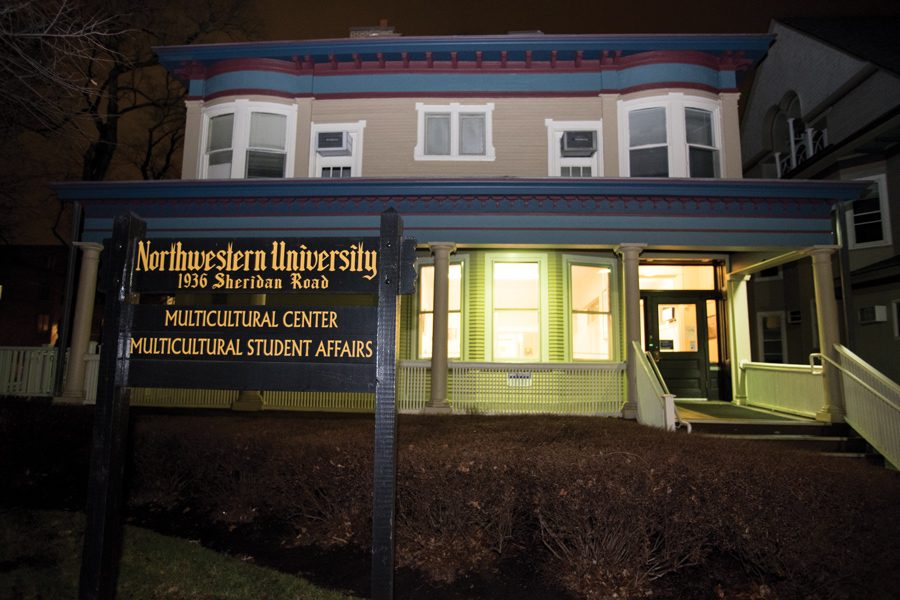Multicultural Greek Council gains momentum in efforts to receive on-campus space
Daily file photo by Colin Boyle
Northwestern’s Multicultural Center, 1936 Sheridan Rd. MSA runs several affinity book clubs.
May 10, 2018
Members of Multicultural Greek Council chapters say tangible progress has been made in their continued efforts to receive University-recognized space on campus.
The Office of Fraternity and Sorority Life is considering establishing the Commuter Lounge, located on the ground floor of Norris University Center, as a designated MGC site, said OFSL director Travis Martin. The office has recently partnered with both councils to advocate for a greater on-campus presence, Martin said, adding that while the Commuter Lounge location hasn’t been finalized, conversations continue to move forward.
“What we’re trying to do is figure out alternative ways to create visibility for these groups on campus,” he said. “A lot of students, when they come to Northwestern (and) think of fraternity and sorority life, think primarily, I would argue, of IFC and PHA — the groups that have prominent structures on campus.”
Students in MGC and National Pan-Hellenic Council have previously raised concerns about the lack of University-designated space for students of color.
Angelica Miranda, president of MGC sorority Lambda Theta Alpha, called the potential for established space and increased visibility “really exciting.” While her chapter uses locations like the Multicultural Center to hold meetings and come together, it would be “very different” to have a space just for MGC, the Communication junior said.
And securing that space is vital, she said, as it can often feel like MGC chapters “don’t exist” to the greater campus community.
“Everybody seems to know about the rest of the councils, or just two out of the four,” Miranda said. “So just even having this space for us will be great because that way incoming students next year — even current students who may not know about us — will get to see us more.”
McCormick junior Fabian Gomez, president of Omega Delta Phi fraternity, an MGC chapter, said the current lack of visibility can “delegitimize” chapters not in IFC or PHA when they seek new members.
Gomez said his chapter has fewer than 10 active members. The lack of on-campus space, he said, is “definitely connected” to lower recruitment. Having a physical representation of the council on campus, he added, is a positive step forward toward “bridging that inequality.”
“I’m not really asking for them to build a new dorm for us (or) build a new house for us,” Gomez said. “But just in some way, make it so that people know we exist and that subconsciously they see us — just like every day they subconsciously see the letters on every single frat house.”
The efforts come as students in MGC and NPHC push for greater representation and resources from the University, saying that a gap in recognition exists between those councils and primarily white ones.
Currently in the works is another initiative to create and display banners on street light poles during Wildcat Welcome. Together, Gomez said, the efforts can add up to create a campus environment that is more supportive and aware of MGC chapters.
MGC president Kathy Tian said that at the moment, establishing a significant presence on campus for the council can be particularly difficult without the “same kind of infrastructure” as IFC and PHA.
Still, the Weinberg junior said she’s seen much stronger action from OFSL recently in supporting MGC chapters.
While graduate assistants previously functioned as short-term primary advisers for MGC, OFSL assistant director Keith Garcia now fills that role permanently — a change that has increased the council’s ability to communicate with upper-level administrators, Tian said.
And with development of the new University Commons potentially on the horizon, she said established space in Norris now can translate to greater effects on the council later.
“If we have space now, then it’ll be a lot easier to have space in the new Norris,” Tian said. “It’s easier to deny us something we never had to begin with than it is to take something away.”
Kappa Phi Lambda sorority president Chen Chen emphasized, however, that securing a location in Norris doesn’t “automatically translate” into designated space in the future and that continued communication is essential.
Ongoing dialogue has occurred about what the possible space in the Commuter Lounge could look like and what functions it would serve for the MGC community, the Weinberg junior said. As the new proposed model for residential housing would count Greek housing toward the two-year live-in requirement, Chen said MGC chapters could be put at a further recruiting disadvantage if they don’t have residential spaces, and stressed taking that into account moving forward.
Tian echoed that while the Commuter Lounge initiative has important potential, it’s only one step forward, and that University support shouldn’t end there.
“It’s just one of many steps we want to take to give people of color a space and help recognize the MGC community, and help people realize that if multicultural Greek life is for them, we have a place for them to be,” Tian said.



